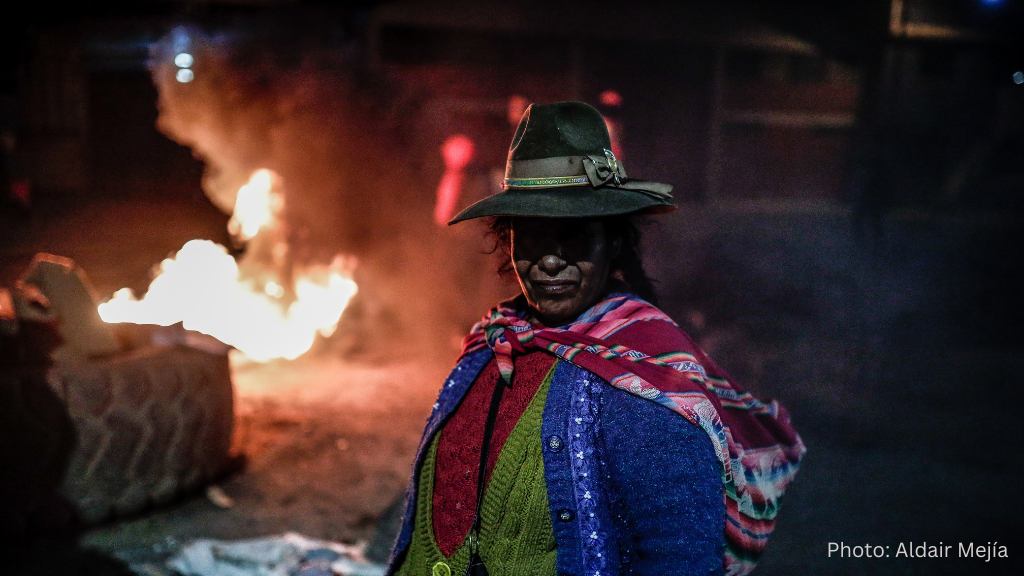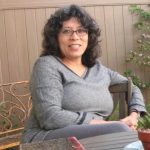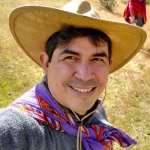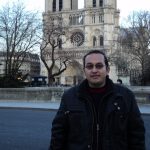Events

- This event has passed.

What’s Happening in Peru? Interdisciplinary Perspectives on a Structural Crisis
April 18, 2023 @ 5:00 pm - 6:30 pm | Virtual Event
Peru has been in a state of political and humanitarian crisis since early December 2022 when protests erupted in the wake of former President Pedro Castillo’s unsuccessful attempt to shut down Congress to avert an impeachment. When acting President Dina Boluarte–Castillo’s former vice president—announced that elections would not be held until May 2024, Peruvians across the country took to the streets first to demand elections and a constitutional assembly and then, when the national police violently repressed protests, to demand Boluarte’s resignation. Months later, more than 60 Peruvians have died, including 47 protestors killed by state forces, mostly from Southern Andean regions of the country, and Boluarte has refused to resign.
The current situation in Peru is the latest expression of a deep structural crisis, rooted in historical relations of dominance since colonial times in the highly centralized country. This is reflected in the long-standing conflictive relationship between the capital, Lima, and the other regions, which has polarized the public debate even more. The role of media and emerging technologies have played a crucial role in how these protests have been represented, adding fire to this polarization. To understand this multidimensional crisis from multidisciplinary perspectives, this round table features scholars from both the humanities and social sciences who will reflect on the historical, social, cultural, economic, and political implications of the ongoing crisis for the future of Peru.
Panelists
 Aldair Mejía (Photojournalist, Lima) is a photojournalist based in Lima, Peru. He currently focuses his work on political issues, social conflicts, portraits, concerts, among other events in the country. During the last years Aldair has been working as a collaborator for the EFE agency of Spain and Diario La República, his photographs have been published by agencies such as CNN in Spanish, EFE Agency, New York Times, Clarín, La Vanguardia, Washington Post, etc. He is also a member of the Association of Photo Journalists of Peru (AFPP). Finalist in the IPYS contest, Recognition in the 35 Awards, Second Place in the Photojournalism category in the Entel contest, Winner in the PhotoEspaña contest.
Aldair Mejía (Photojournalist, Lima) is a photojournalist based in Lima, Peru. He currently focuses his work on political issues, social conflicts, portraits, concerts, among other events in the country. During the last years Aldair has been working as a collaborator for the EFE agency of Spain and Diario La República, his photographs have been published by agencies such as CNN in Spanish, EFE Agency, New York Times, Clarín, La Vanguardia, Washington Post, etc. He is also a member of the Association of Photo Journalists of Peru (AFPP). Finalist in the IPYS contest, Recognition in the 35 Awards, Second Place in the Photojournalism category in the Entel contest, Winner in the PhotoEspaña contest.
 Cecilia Mendez (UCSB) is a Professor of History at the University of California, Santa Barbara. A Peruvian historian specialized in the social and political history of Peru in the national period, she received her Ph.D. from the State University of New York at Stony Brook, and numerous prestigious awards, including the Howard Cline book prize for her book The Plebeian Republic (Duke, 2005). Her work calls the attention on the importance of late eighteenth-century, and nineteenth-century political developments in shaping modern conceptions nationhood, citizenship, and “race” in Peru. She has investigated the historical relationship between the peasants and the militaries, and the role of war and the army in the construction of the state. She is a columnist for the Peruvian newspaper La República.
Cecilia Mendez (UCSB) is a Professor of History at the University of California, Santa Barbara. A Peruvian historian specialized in the social and political history of Peru in the national period, she received her Ph.D. from the State University of New York at Stony Brook, and numerous prestigious awards, including the Howard Cline book prize for her book The Plebeian Republic (Duke, 2005). Her work calls the attention on the importance of late eighteenth-century, and nineteenth-century political developments in shaping modern conceptions nationhood, citizenship, and “race” in Peru. She has investigated the historical relationship between the peasants and the militaries, and the role of war and the army in the construction of the state. She is a columnist for the Peruvian newspaper La República.
 Carlos Molina-Vital (University of Illinois Urbana-Champaign) currently works as an instructor and director of the Quechua Program at the Center for Latin American and Caribbean Studies at the University of Illinois at Urbana-Champaign. He has two master’s degrees in Linguistics: one from the Pontifical Catholic University of Peru (2005), the other from Rice University, in Houston, Texas (2012). He is currently finishing his doctorate in Andean Studies (Linguistics) at the Pontificia Universidad Católica del Perú. His studies of the Quechua languages include varieties spoken in Ancash, Ayacucho, Apurimac, and Cuzco in Peru. Since 2018, he has coordinated the QINTI project (Quechua Innovation and Teaching Initiative). With his collaborators he is currently writing Ayni, which aims to an open access manual for Southern Quechua and intended to help teachers and students of Quechua in the United States and around the world draw on the shared characteristics and diversity of Quechua varieties mutually intelligible in Peru and Bolivia.
Carlos Molina-Vital (University of Illinois Urbana-Champaign) currently works as an instructor and director of the Quechua Program at the Center for Latin American and Caribbean Studies at the University of Illinois at Urbana-Champaign. He has two master’s degrees in Linguistics: one from the Pontifical Catholic University of Peru (2005), the other from Rice University, in Houston, Texas (2012). He is currently finishing his doctorate in Andean Studies (Linguistics) at the Pontificia Universidad Católica del Perú. His studies of the Quechua languages include varieties spoken in Ancash, Ayacucho, Apurimac, and Cuzco in Peru. Since 2018, he has coordinated the QINTI project (Quechua Innovation and Teaching Initiative). With his collaborators he is currently writing Ayni, which aims to an open access manual for Southern Quechua and intended to help teachers and students of Quechua in the United States and around the world draw on the shared characteristics and diversity of Quechua varieties mutually intelligible in Peru and Bolivia.
 Mariela Noles Cotito (Universidad del Pacífico, Lima) is a Professor of Political Science and of Discrimination and Public Policy at Universidad del Pacifico, in Lima, Peru. Her research agenda includes topics of gender equality, social inclusion policies in Peru, and how the intersection of different systems of oppression position different groups of people outside of the scope of legal protection. Most recently she is focused on exploring the effectiveness of ethnoracial legislation to promote and protect the rights of Afrodescendants in Peru. She holds a Law degree from the Pontificia Universidad Catolica del Peru, an LLM from the University of Pennsylvania, and two MA degrees in Latin American Studies and Political Science from the University of South Florida. Concurrently, she has held positions in the Ministry of Women and Vulnerable Populations and the Ministry of Culture in Peru, and a top advisory position in the Office of Women and Equality of the Metropolitan Municipality of the City of Lima on issues of diversity and social inclusion.
Mariela Noles Cotito (Universidad del Pacífico, Lima) is a Professor of Political Science and of Discrimination and Public Policy at Universidad del Pacifico, in Lima, Peru. Her research agenda includes topics of gender equality, social inclusion policies in Peru, and how the intersection of different systems of oppression position different groups of people outside of the scope of legal protection. Most recently she is focused on exploring the effectiveness of ethnoracial legislation to promote and protect the rights of Afrodescendants in Peru. She holds a Law degree from the Pontificia Universidad Catolica del Peru, an LLM from the University of Pennsylvania, and two MA degrees in Latin American Studies and Political Science from the University of South Florida. Concurrently, she has held positions in the Ministry of Women and Vulnerable Populations and the Ministry of Culture in Peru, and a top advisory position in the Office of Women and Equality of the Metropolitan Municipality of the City of Lima on issues of diversity and social inclusion.
 Nelson Pereyra (Universidad Nacional San Cristóbal de Huamanga, Ayacucho) is a historian, graduated from the National University of San Cristóbal de Huamanga, with master’s studies at the Pontifical Catholic University of Peru and Pablo de Olavide University in Spain. In addition, he holds a Ph.D. in History with a Mention in Andean Studies. His lines of research are related to the political participation of peasants in the formation of the Peruvian State and to regional history and culture. He has recently published the books: History, Memory and Symbolism of Holy Week in Ayacucho, State, Memory and Contemporary Society in Ayacucho, Cusco and Lima (edited together with Claudia Rosas) and Living and Active regions: Knots and Foundations of Contemporary Peru (co-authored with Susana Aldana Rivera).
Nelson Pereyra (Universidad Nacional San Cristóbal de Huamanga, Ayacucho) is a historian, graduated from the National University of San Cristóbal de Huamanga, with master’s studies at the Pontifical Catholic University of Peru and Pablo de Olavide University in Spain. In addition, he holds a Ph.D. in History with a Mention in Andean Studies. His lines of research are related to the political participation of peasants in the formation of the Peruvian State and to regional history and culture. He has recently published the books: History, Memory and Symbolism of Holy Week in Ayacucho, State, Memory and Contemporary Society in Ayacucho, Cusco and Lima (edited together with Claudia Rosas) and Living and Active regions: Knots and Foundations of Contemporary Peru (co-authored with Susana Aldana Rivera).
Moderators
Alejandra Watanabe Farro (LALS, UCSC)
Amanda Smith (Literature, UCSC)
Carla Hernández Garavito (Anthropology, UCSC)
Co-organized with Saskia Nauenberg Dunkell (The Humanities Institute, UCSC)
Registration required to receive the zoom link.
In Spanish with simultaneous English interpretation
This event is presented by The Humanities Institute and co-sponsored by the Department of Latino and Latin American Studies, the Spanish Studies program, Arts Research Institute, and the Dolores Huerta Research Center.
¿Qué está pasando en el Perú? Perspectivas interdisciplinarias para entender una crisis estructural
Desde principios de diciembre del 2022, el Perú atraviesa una crisis política y humanitaria cuando estallaron las protestas a raíz del intento fallido del expresidente Pedro Castillo de cerrar el Congreso para evitar la vacancia por incapacidad moral. Cuando la presidenta en funciones Dina Boluarte –exvicepresidenta de Castillo– anunció que las elecciones no se realizarían hasta mayo de 2024, peruanos de todo el país salieron a las calles primero para exigir elecciones y asamblea constituyente y, cuando la Policía Nacional y el Ejército reprimieron violentamente las protestas, exigir la renuncia de Boluarte. Meses después, más de 60 peruanos han muerto, incluidos al menos 47 manifestantes asesinados por las fuerzas estatales, en su mayoría de las regiones andinas del sur del país, y Boluarte se niega a renunciar.
La situación actual del Perú es la expresión más reciente de una profunda crisis estructural, arraigada en históricas relaciones de dominio desde la época colonial en un país altamente centralizado. Esto se refleja en la conflictiva relación entre la capital, Lima, y las demás regiones, que ha polarizado aún más el debate público. El papel de los medios y las nuevas tecnologías ha jugado un papel crucial en la forma en que se han representado estas protestas, agregando tensión a esta polarización. Para comprender esta crisis estructural desde perspectivas multidisciplinarias, esta mesa redonda convoca académicos de las humanidades y ciencias sociales para reflexionar colectivamente sobre las implicaciones históricas, sociales, culturales, económicas y políticas de la crisis actual para el futuro de Perú.
Panelistas
 Aldair Mejía es Fotoperiodista, en Lima,Perú, cuyo trabajo se centra principalmente en coberturas de prensa. Actualmente enfoca su labor en temáticas políticas, conflictos sociales, retratos, conciertos, entre otros acontecimientos en el país. Durante los últimos años Aldair ha estado trabajando como colaborador para la agencia EFE de España y Diario La República, sus fotografías han sido publicadas las agencias, como CNN en español, Agencia EFE, New York Times, Clarín, La Vanguardia, Washington Post, etc. También es miembro de la Asociación de Foto Periodistas del Perú (AFPP). Finalista en el concurso IPYS, Reconocimieno en los 35 Awards, Segundo Puesto en la categoria de Fotoperiodismo en el concurso de Entel, Ganador en el concurso de PhotoEspaña.
Aldair Mejía es Fotoperiodista, en Lima,Perú, cuyo trabajo se centra principalmente en coberturas de prensa. Actualmente enfoca su labor en temáticas políticas, conflictos sociales, retratos, conciertos, entre otros acontecimientos en el país. Durante los últimos años Aldair ha estado trabajando como colaborador para la agencia EFE de España y Diario La República, sus fotografías han sido publicadas las agencias, como CNN en español, Agencia EFE, New York Times, Clarín, La Vanguardia, Washington Post, etc. También es miembro de la Asociación de Foto Periodistas del Perú (AFPP). Finalista en el concurso IPYS, Reconocimieno en los 35 Awards, Segundo Puesto en la categoria de Fotoperiodismo en el concurso de Entel, Ganador en el concurso de PhotoEspaña.
 Cecilia Mendez es profesora de Historia en la Universidad de California, Santa Bárbara. Historiadora peruana especializada en la historia social y política del Perú en el período nacional, recibió su Ph.D. de la Universidad Estatal de Nueva York en Stony Brook, y varios prestigiosos premios, incluido el premio del libro Howard Cline por su libro The Plebeian Republic (Duke, 2005). Su trabajo llama la atención sobre la importancia de los desarrollos políticos de finales del siglo XVIII y del siglo XIX en la formación de las concepciones modernas de nación, ciudadanía y “raza” en el Perú. Y han investigado la relación histórica entre los campesinos y los militares, y el papel de la guerra y el ejército en la construcción del Estado. Es columnista del diario peruano La República.
Cecilia Mendez es profesora de Historia en la Universidad de California, Santa Bárbara. Historiadora peruana especializada en la historia social y política del Perú en el período nacional, recibió su Ph.D. de la Universidad Estatal de Nueva York en Stony Brook, y varios prestigiosos premios, incluido el premio del libro Howard Cline por su libro The Plebeian Republic (Duke, 2005). Su trabajo llama la atención sobre la importancia de los desarrollos políticos de finales del siglo XVIII y del siglo XIX en la formación de las concepciones modernas de nación, ciudadanía y “raza” en el Perú. Y han investigado la relación histórica entre los campesinos y los militares, y el papel de la guerra y el ejército en la construcción del Estado. Es columnista del diario peruano La República.
 Carlos Molina-Vital se desempeña como instructor y responsable del Programa de Quechua en el Centro de Estudios Latinoamericanos y Caribeños de la Universidad de Illinois en Urbana-Champaign. Tiene dos maestrías en Lingüística: una de la Pontificia Universidad Católica del Perú (2005), la otra de la Universidad Rice, en Houston, Texas (2012). Actualmente está terminando su doctorado en Estudios Andinos en la Pontificia Universidad Católica del Perú. Sus estudios de las lenguas quechuas incluyen variedades habladas en Ancash, Ayacucho, Apurímac y Cuzco en Perú. Desde 2018 coordina el proyecto QINTI (Iniciativa de Innovación y Enseñanza Quechua, por sus siglas en inglés). Con sus colaboradores está escribiendo actualmente Ayni, que busca ser un manual de acceso abierto para quechua sureño y destinado a ayudar a profesores y estudiantes de quechua en los Estados Unidos y en todo el mundo a partir de las características compartidas y la diversidad de las variedades quechua mutuamente inteligibles habladas en Perú y Bolivia.
Carlos Molina-Vital se desempeña como instructor y responsable del Programa de Quechua en el Centro de Estudios Latinoamericanos y Caribeños de la Universidad de Illinois en Urbana-Champaign. Tiene dos maestrías en Lingüística: una de la Pontificia Universidad Católica del Perú (2005), la otra de la Universidad Rice, en Houston, Texas (2012). Actualmente está terminando su doctorado en Estudios Andinos en la Pontificia Universidad Católica del Perú. Sus estudios de las lenguas quechuas incluyen variedades habladas en Ancash, Ayacucho, Apurímac y Cuzco en Perú. Desde 2018 coordina el proyecto QINTI (Iniciativa de Innovación y Enseñanza Quechua, por sus siglas en inglés). Con sus colaboradores está escribiendo actualmente Ayni, que busca ser un manual de acceso abierto para quechua sureño y destinado a ayudar a profesores y estudiantes de quechua en los Estados Unidos y en todo el mundo a partir de las características compartidas y la diversidad de las variedades quechua mutuamente inteligibles habladas en Perú y Bolivia.
 Mariela Noles Cotito es profesora de Ciencia Política, y Discriminación y Políticas Públicas en la Universidad del Pacífico. Es abogada por la PUCP; máster en Derecho por la University of Pennsylvania; máster en Estudios Latinoamericanos y máster en Ciencia Política, con una concentración en Etnicidad en Países Andinos, por la University of South Florida. Su portafolio de investigación incluye temas de derechos humanos, igualdad de género y no discriminación, así como el análisis de políticas públicas de inclusión en el país. Ha sido parte de equipos técnicos en el Ministerio de la Mujer, el Ministerio de Cultura y la Gerencia de la Mujer de la Municipalidad Metropolitana de Lima.
Mariela Noles Cotito es profesora de Ciencia Política, y Discriminación y Políticas Públicas en la Universidad del Pacífico. Es abogada por la PUCP; máster en Derecho por la University of Pennsylvania; máster en Estudios Latinoamericanos y máster en Ciencia Política, con una concentración en Etnicidad en Países Andinos, por la University of South Florida. Su portafolio de investigación incluye temas de derechos humanos, igualdad de género y no discriminación, así como el análisis de políticas públicas de inclusión en el país. Ha sido parte de equipos técnicos en el Ministerio de la Mujer, el Ministerio de Cultura y la Gerencia de la Mujer de la Municipalidad Metropolitana de Lima.
 Nelson Pereyra es historiador, egresado de la Universidad Nacional de San Cristóbal de Huamanga, con estudios de maestría en la Pontificia Universidad Católica del Perú y en la Universidad Pablo de Olavide en España. Además, es doctor en Historia con Mención de Estudios Andinos. Sus ejes de investigación están relacionados con la participación política de los campesinos en la formación del Estado peruano y con la historia y cultura regional. Recientemente ha publicado los libros: Historia, memoria y simbolismo de la Semana Santa de Ayacucho, Estado, memoria y sociedad contemporánea en Ayacucho, Cusco y Lima (editado junto a Claudia Rosas) y Regiones vivas y activas: nudos y fundamentos del Perú contemporáneo (en coautoría con Susana Aldana Rivera).
Nelson Pereyra es historiador, egresado de la Universidad Nacional de San Cristóbal de Huamanga, con estudios de maestría en la Pontificia Universidad Católica del Perú y en la Universidad Pablo de Olavide en España. Además, es doctor en Historia con Mención de Estudios Andinos. Sus ejes de investigación están relacionados con la participación política de los campesinos en la formación del Estado peruano y con la historia y cultura regional. Recientemente ha publicado los libros: Historia, memoria y simbolismo de la Semana Santa de Ayacucho, Estado, memoria y sociedad contemporánea en Ayacucho, Cusco y Lima (editado junto a Claudia Rosas) y Regiones vivas y activas: nudos y fundamentos del Perú contemporáneo (en coautoría con Susana Aldana Rivera).

